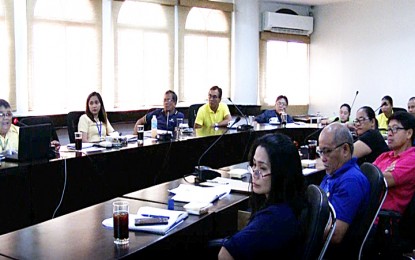
ABOUT COFFEE. The Palawan Coffee Council holds a meeting for the first time on April 5 at the Provincial Capitol Building in Puerto Princesa. (Photo courtesy of Provincial Information Office of Palawan)
PUERTO PRINCESA CITY, Palawan -- Seeing the need to explore the province’s coffee production potentials, the Palawan government has recently created a council to lead the management and implementation of programs and projects to promote coffee as its top agricultural crop.
The creation of Provincial Coffee Councils (PCC) is mandated by the national government to help in the development of coffee farming and production in the provinces, and for farmers to be able to access interventions provided by the Department of Agriculture (DA).
“There is a need for provinces to create a PCC for interventions we can gain access through and avail from the DA,” Romeo Biobe Palao, High Value Crops Development Program (HVCDP) provincial coordinator of the Office of the Provincial Agriculturist (OPA), said Saturday.
Based on initial estimates by the OPA this year, Palawan has 576 hectares of land being planted with different varieties of coffee, generating an average yield of 0.17 metric tons.
Palao said that of the total land areas, 158 hectares are planted with robusta and 414 hectares with the liberica variety.
“That is just the initial that is why we need to do benchmarking. Let us go to the municipalities and see where else are we planting coffee,” he said.
He said there is a need to focus on helping coffee growers in Palawan in terms of educating them on the proper planting of the bean tree to ensure increase in harvests.
At present, the Philippines has a national average production of 500 kilos per hectare of coffee. Palawan’s yield is 100 kilos per hectare.
Meanwhile, during its first consultative meeting on April 5, the members of the council learned that problems besetting coffee growers include seeds sourcing, pest and diseases, fertilizers, land suitability and environment, proper cultural management, post-harvest management, harvesting, packaging, and marketing.
Jane Buenaobra, officer-in-charge of the OPA, said one of the solutions that may solve the seeds sourcing problem is to have a mother plant garden that would supply the seedling and rooted cuttings requirements of coffee growers and farmers.
On the other hand, Board Member Albert Rama, the chairman of the Committee on Environment and Natural Resources of the Sangguniang Panlalawigan, said agricultural development, technology, financing, facilities and types of machinery, and infrastructure should also be given consideration in the development of Palawan’s coffee industry.
“When it comes to coffee, the moment we launch any program, we also need to identify the areas, what types of facilities we have or we need, what infrastructure projects should be established to support its growth,” he stated.
He said the provincial government fully supports agro and tourism development to reduce the province’s poverty index from 57 percent to 25 percent, and potential coffee growers should take advantage of it.
The council is chaired by Palawan Governor Jose Alvarez with the DA-Mimaropa as co-chairperson.
It is also composed of the Provincial Agrarian Reform Office, Department of Science and Technology, Department of Environment and Natural Resources-Provincial Environment and Natural Resources, Provincial Cooperative Development Office, Western Philippine University, League of Municipal Agriculturists, Agricultural Credit Policy Council, Department of Trade and Industry, Philippine Coconut Authority, National Commission of Indigenous People, Sangguniang Panlalawigan-Committee on Agriculture, Philippine Crop Insurance Corporation, Landbank of the Philippines and the Caramay Coffee Planters MPC. (PNA)
